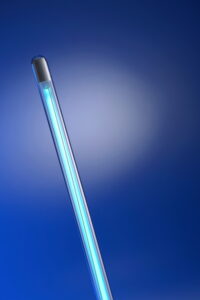As concerns about indoor air quality continue to rise, many homeowners are exploring different methods to keep their living spaces clean and safe. One popular option is the UV air purifier, a device that uses ultraviolet (UV) light to eliminate harmful microorganisms like bacteria, viruses, and mold from the air. But with the term “UV light” often associated with harmful exposure, it’s natural to wonder: are UV air purifiers dangerous to have in a home?
We want to put your mind at ease. UV air purifiers are not only effective but also safe for both humans and pets when used correctly. Let’s dive into how these systems work, the safety precautions in place, and why professional installation is essential.
How Do UV Air Purifiers Work?
UV air purifiers function by using ultraviolet light, specifically UV-C light, to destroy airborne pathogens. UV-C light has germicidal properties, meaning it can deactivate the DNA of bacteria, viruses, and other harmful microorganisms, rendering them harmless.
The UV light in these purifiers is housed within the HVAC system, usually near the air handler or within the ductwork. As air circulates through the HVAC system, it passes by the UV-C light, which kills or neutralizes the pathogens before the air is recirculated throughout the home. This process helps maintain a cleaner and healthier indoor environment, reducing the spread of illnesses and improving overall air quality.
Are UV Air Purifiers Safe?
Yes! And here’s why:
- Contained Exposure: The UV-C light in an air purifier is contained within the HVAC system, which means it’s not exposed to the living areas of your home. The light only operates within the closed environment of the air handler or ductwork, so there’s no direct exposure to the UV light for humans or pets.
- Wavelength Considerations: UV-C light has a shorter wavelength than the UV-A and UV-B light that we encounter from the sun. While UV-C light is highly effective at killing microorganisms, it doesn’t have the same penetration power as other types of UV light, meaning it doesn’t pass through materials like the outer casing of the air purifier or HVAC system.
- Built-In Safety Mechanisms: UV air purifiers are equipped with safety mechanisms that ensure the UV light is contained and only operates when necessary. For example, the light may be set to turn on only when the HVAC system is running, further minimizing any potential risk.
- Non-Toxic Operation: Unlike some air purifiers that rely on chemicals or ozone, UV air purifiers do not produce any harmful byproducts. The UV-C light simply neutralizes pathogens, and the air that is recirculated into your home is free from any toxic substances.
Professional Installation
While UV air purifiers are safe and effective, proper installation is crucial to ensure they work as intended. A poorly installed UV air purifier may not be effective at neutralizing pathogens, or worse, it could lead to inefficiencies in your HVAC system.
We strongly recommend that UV air purifiers be installed by a professional HVAC contractor. We offer UV air purifier services in Monument, and our technicians are trained to install these systems correctly, ensuring that the UV-C light is properly contained and that the air purifier is integrated seamlessly with your existing HVAC system.
Robbins Heating & Air Conditioning serves Colorado Springs and the surrounding area. Contact us to learn more about UV air purifiers and other indoor air quality options for your home.

